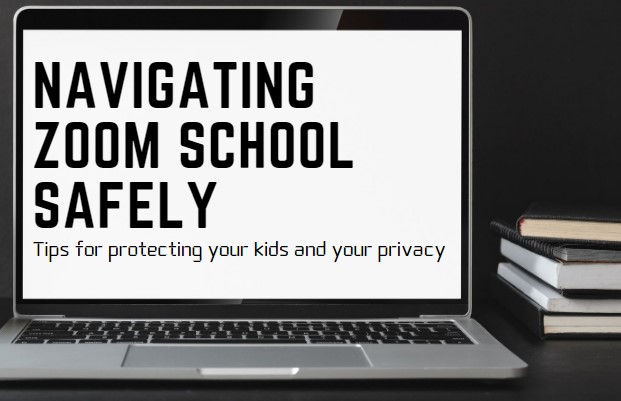Are you navigating the world of “zoom schooling”? Are you concerned about safety and privacy in a world of ever increasing online interactions?
Doug Parisi, the Director of Training at SafeDefend.com suggests the following.
Camera Concerns
Once you or your child is done with their virtual session, it’s extremely important they log out and close the program.
“The meetings are sometimes left active, which is like being spied on for those that have not logged out,” Parisi says. This also means being mindful of when the camera and microphone are on and off. Parisi suggests asking your child to turn off the microphone when they’re speaking to you. There may be private conversations that others can pick up on that reveal information about where kids are or when a parent is leaving the house.
Also, you don’t want their teacher, classmates, or co-workers knowing your family business.
When you/your child is not using the camera for virtual learning, you may also want to put a piece of tape over the laptop’s camera. Parisi says many hackers have been able to bypass this security and look right into children’s bedrooms, especially on non-Mac computers.
“The light indicating the camera is on can be bypassed so you might not realize the camera is on,” says Parisi.
A piece of tape is an easy fix because it can be removed and replaced as needed.
Hacking Problems
As much as schools and businesses do their best to keep virtual learning meetings private, hackers are always out there and they’re good at their job. They’re known to do things like “Zoom bombing,” where they start posting inappropriate content during live meetings.
Parisi says staff has to post links on websites and send mass emails with multiple login credentials depending on the class enrolled. This can lead to security issues.
“As a precaution, students should be told never to share any links or emails from the teacher,” says Parisi.
Children, as well as adults, can also be victims of identity fraud, and it often takes longer to know when it’s happened. So, no important information should be shared through a group chat. This includes personal information (address, birth date, phone number, etc.) and if your child is using any public or shared computers, be sure they don’t save username or password information.
Protecting Your Child
If you realize your child’s safety has been compromised, it’s important to change their online presence.
“This means signing out from all apps/media until changes can be made, deleting any email accounts that have been compromised, and requesting a new email from the school,” says Parisi.
Passwords should also be changed so that they’re longer and harder to guess. Kids should be reminded that certain security controls are only activated once they log out. The lesson here is to be sure your child is always logging out.
You can protect your child from hackers and predators by making sure they’re being as safe as possible. Parisi says this includes:
- No internet usage with a closed bedroom door
- Putting the computer in a more public area
- Authorize remote access so you can look at what they are doing from your computer
- Activate adult monitoring that requires a password after specific times in the day
It’s also a good idea to have open and honest conversations with your kids about people who will attempt to compromise their safety. Reminding your child that everything they type or do is being recorded is another important tip so that they are mindful of what they’re doing and saying when they’re online.










Follow Me!